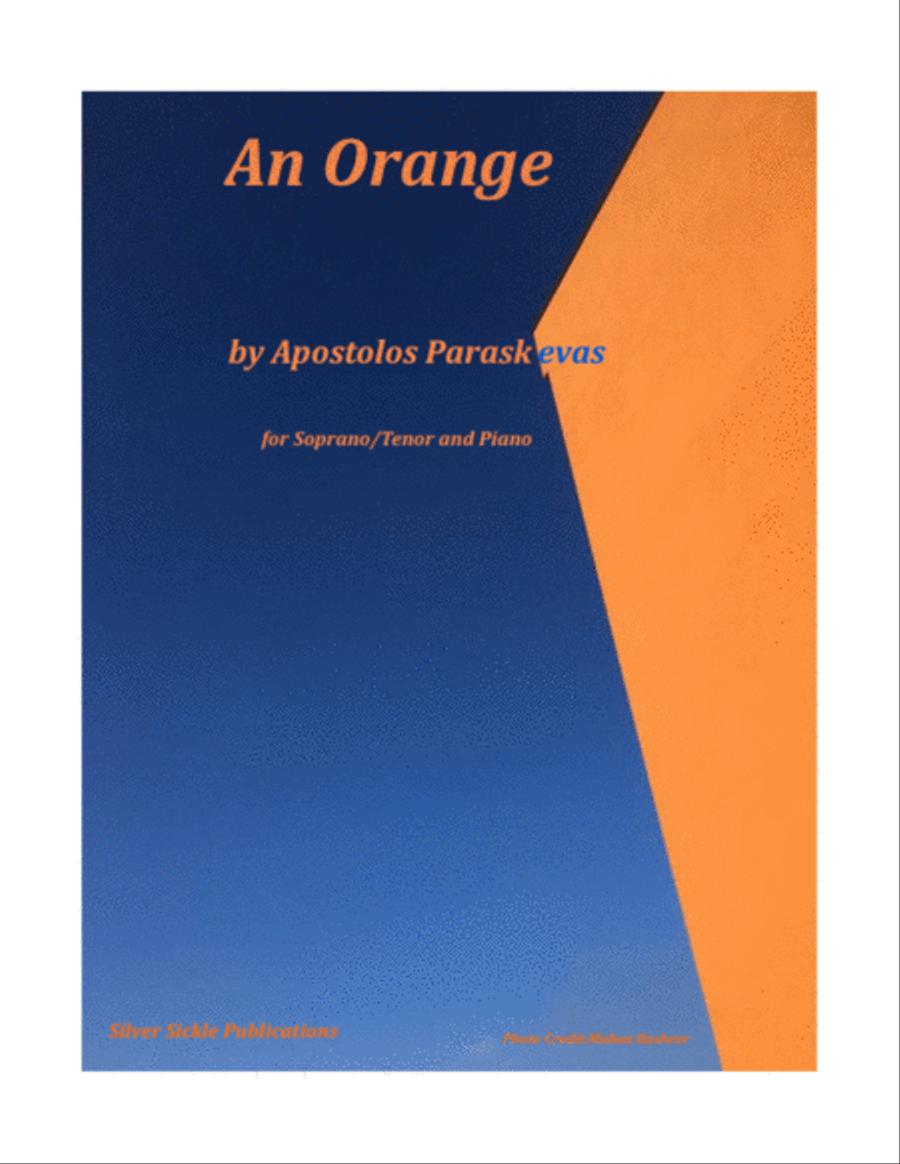Piano,Vocal,Voice - Level 3 - Digital Download SKU: A0.942058 Composed by Apostolos Paraskevas. 20th Century,Jazz,Opera,World. Score. 10 pages. Silver Sickle Publications #4729017. Published by Silver Sickle Publications (A0.942058). This witty and extremely fun work to perform by composer Apostolos Paraskevas was conceived after real events. There is a version for Soprano/tenor and Piano and one for guitar as well. Easy to perform and the text was inspired of the following narrative. I Slaughtered an Orange over the Sink... ...and it just sat there…It didn't say a word, not a sound of anguish, not even when my teeth started to tear apart it's flesh little by little... I knew it was a special orange but I couldn't fathom the magnitude of its character…Even when gentle I took it away from its friends there at the top of the kitchen counter, it looked at me almost with a sense of gratitude. Yes, gratitude.! As if it was saying: Thank you! Thank you for helping me to fulfill the purpose of my life…Since I was a little seed I knew I would serve a higher purpose. My sacrifice will help a human to become a healthier mother, doctor, composer, a better scientist. Yes, I think I felt it said…a better composer as well. ...and there I was, sinking my teeth deep inside its flesh and taking all of what it had to offer. It's life, it's substance, it's gratitude for serving a higher purpose. I slaughtered it over the sink, to avoid any evidence of what had happen there. The remaining outer sell, I placed it on the stove top and lighted up with fire, as my mother use to do, to release the heavenly smell and there it was. Evaporated everywhere! I inhale it, It became totally a part of me. Today, I slaughtered an orange over the sink and I didn’t say thank you! Apostolos Paraskevas is a classical guitarist and composer as well as an award-winning film director and producer. He has received multiple international awards for his compositions and was nominated for a Grammy Award. He is the only guitarist ever to have a major orchestral piece performed at Carnegie Hall under the direction of Lukas Foss––and the only musician who has performed there in a Grim Reaper outfit. He was the founder and served for 16 years as the artistic director of the International Guitar Congress-Festival of Corfu, Greece. He is a voting member of the Recording Academy (Grammys). After his undergraduate music studies in Volos he pursued advanced studies in classical guitar with Costas Cotsiolis (diploma, 1990) and Leo Brouwer (Havana 1984, 1988), as well as postgraduate studies in composition with Lukas Foss and Theodore Antoniou (DMA in composition, Boston University, 1998). Paraskevas embarked on a successful career as a guitar soloist and contemporary composer, achieving distinctions in both disciplines: Grammy nomination for Chase Dance (Bridge Records, 1999); first prize for Night Wanderings (Lukas Foss Composition Competition, 2000); first prize for Phygein Adynaton (National Composers Conference, 1997); and numerous prestigious commissions, performances, and publications. Following teaching posts at Northeastern and Boston Universities, Paraskevas has taught since 2001 at the Berklee College of Music in Boston (professor of composition and classical guitar). His eclectic compositional style arises as an idiosyncratic integration of seemingly conflicting influences – from avant-garde approaches to harmonic structure, form, and timbre, to pop-folk modal and rhythmical concepts – amalgamated into a personal evocative musical language, characterized by rhythmic verve, melodic grace, dramatic (and sometimes unexpectedly humorous) gestures, and ritualistic or theatrical elements. The latter feature has also led Paraskevas to the creation of films, notably the acclaimed I Finally Did It (Gold award, California Film Awards 2010), dealing wittily with Death, a recurring extra-musical theme in his music. The Groves Dictionary of Music Costas.
